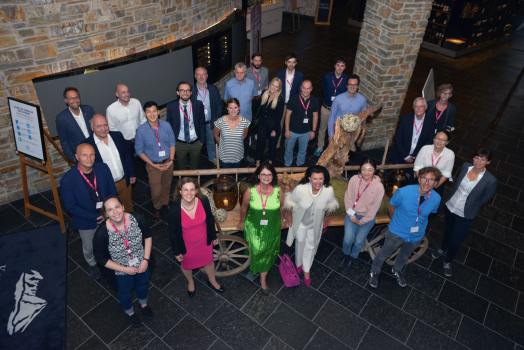Berchtesgaden Microbiome Science Days 2021 – intense exchange between basic scientists, translational researchers and clinicians

The Institute of Clinical Molecular Biology (IKMB) hosts since 2016 the high-profile annual microbiome symposium Berchtesgaden Microbiome Science Days (BMSD).
The recent hype in microbiome-disease relationships has made this a highly visible topic from basic science to clinical scientific meetings. The microbiome holds great potential to prevent or even treat chronic human diseases as it can be modified through different means such as probiotics or fecal transplantation.
The Berchtesgaden Microbiome Science Days provide a novel interaction space between basic scientists, translational researchers and clinicians. The interactive discussion circle is consciously limited to 20 invited speakers and 20 young scientists. The participants touch a series of important topics from basic science to clinical translation and intend to develop new ideas and plans for scientific interrogation by this intense interdisciplinary interaction.
This year the following members of the Research Unit miTarget, speaker: Andre Franke, contributed to the discussion by talks about their current research:
- Andre Franke & Corinna Bang:
Microbiome and multiple sclerosis - Philip Rosenstiel & Magdalena Westermann:
Microbes leave a mark – host-microbiota interactions in malnutrition - Philippe Schmitt-Kopplin:
Application of single cell phenotyping and metabolomics in microbiome research - Stefan Schreiber & Florian Tran:
Post-COVID syndrome
One doctoral researcher and three post-docs from the RU miTarget got the chance to present and discuss with the experts and other young scientists.
Other speakers were for example:
Kirsten Berding Harold, APC Microbiome, University College Cork, Ireland
Fabian Frost, Klinik und Poliklinik für Innere Medizin A, University of Greifswald, Germany
Torben Hansen, Human Genomics and Metagenomics in Metabolism, Copenhagen University, Denmark
Karsten Kristiansen, Molecular Biology, University of Copenhagen, Denmark
Arthus Johann Liesz, Institute for Stroke and Dementia Research, Munich, Germany
C. Ng, Center for Gut Microbiota Research, The Chinese University of Hong-Kong, China
Michael Zimmermann, Metabolic host-microbiome interactions, European Molecular Biology Laboratory (EMBL), Heidelberg, Germany
Again, the Microbiome Science Days yielded new impulses to current and future research projects and questions. Additionally, new plans for collaborations arose.
